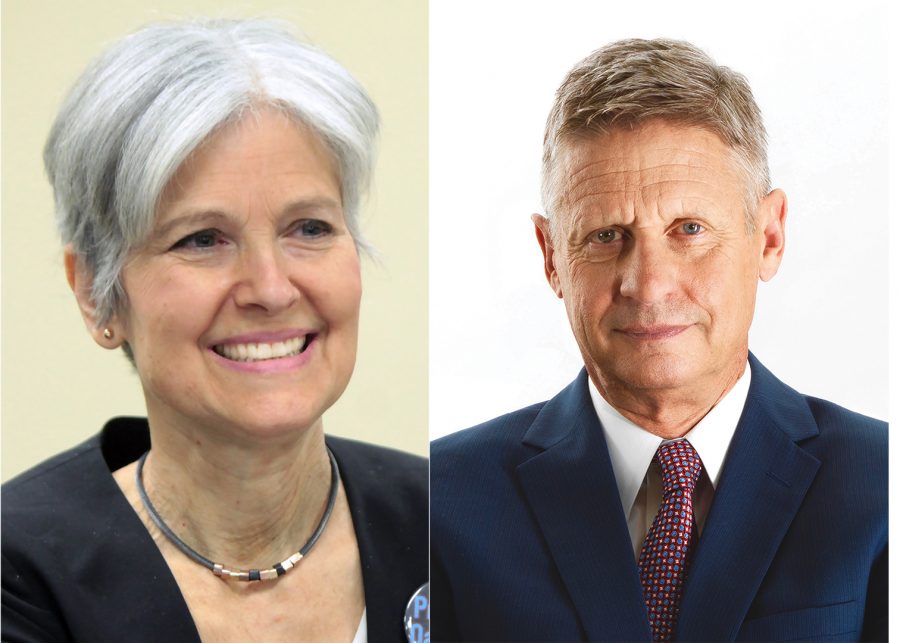PCP: Is voting for a third-party a good idea?
More stories from Cole Tamondong
More stories from Quinn Berleman-Paul
Cole Tamondong
There is nothing wrong with voting for a third-party
This election season has been full of excitement, drama and, for some, horror. The two main party candidates, Hillary Clinton and Donald Trump, are poised to be the most unfavorable candidates since Walter Mondale faced off with Ronald Reagan in 1984. In situations like this, many voters find themselves with seemingly nowhere to turn, and have to choose between two people they can not wholeheartedly support. Third-party candidates offer a solution to this unfortunate problem.
Candidates like Libertarian Gary Johnson and Green Party member Jill Stein offer voters someone to turn to. For someone who is more fiscally conservative but disagrees with Trump’s harshly conservative social policies, like his views on immigration or affinity towards Russia, Johnson might seem like a more appealing option. And for those looking for someone a little more liberal than Clinton, like voters who backed Bernie Sanders in the primary, Stein might be a good option. Many supporters of Bernie Sanders might find Stein a more appealing option than Clinton or Trump.
Some believe that voting for a third-party will take votes away from either Clinton or Trump, and therefore will hand the other the win.
Although some logic exists in this argument, disillusion is not a partisan issue. People from both sides of the aisle find their candidates without merit. In fact, 47 and 46 percent of likely Trump and Clinton voters respectively, cited “So the other candidate doesn’t win” as their primary reason for the candidate they chose according to a Reuters poll. People are more likely to vote for their candidate because they hate the other one than actually agreeing with the candidate their party put forward. If enough of these dissatisfied people devote themselves to going third-party, meaningful change can occur without helping the candidate they dislike the most.
Additionally, Illinois has voted Democrat for the past 20 years, and is expected to do the same again this year. If someone is concerned about voting for a third-party candidate instead of Hillary Clinton, they shouldn’t really worry about swaying the vote away from her. As for traditional Republicans, the outlook isn’t really good either way.
Why should someone who doesn’t agree with or support the main candidates feel pressure to vote for one of them? The two-party system can lead to easier elections, but it can leave the country with a sour taste in its mouth. There shouldn’t be a stigma about voting third-party. Everyone deserves their voice to be heard, and third-party candidates are a positive way to express dissent.
Quinn Berleman-Paul
Voting for a third party is irresponsible
In the 1848 presidential race, Martin van Buren did not obtain enough votes to be the Democratic nominee, so he established the Free-Soil party. A new party diluted the democratic votes and caused an easy victory for Zachary Taylor to win as the Whig candidate, which was the other party at the time.
More than 200 years later, the 2016 presidential election has had nearly 1,800 people filing to become presidential candidates outside of the two-party system. Three are contenders: Jill Stein of the Green Party, Gary Johnson of the Libertarian Party, and Chris Keniston of the Veterans Party.
Because today’s political structure is strictly a two-party system, popular third-party candidates can have a devastating effect on election outcomes. They can cause a ripple effect.
National polls show the current race at a dead-heat, meaning support for both the Republican and Democratic candidates is equal. However, when polls include third-party candidates, the numbers change. The support for Hillary Clinton goes down.
For some people, this is not a problem. However, for people with more liberal beliefs, it is. As shown by the election in 1848, a third-party candidate assures the candidate farthest from the beliefs of the third party candidate will win. In this case, if a portion of liberal voters decide to vote for a candidate other than the Democratic nominee, the GOP candidate, Donald Trump, will win the election.
Voters should consider why they would vote for a third-party candidate. If liberals do not vote for Clinton, they could end up with Trump, who is far out of line with democratic beliefs. If Republicans who do not like Trump do not vote for him, they would make it easier for Clinton to win the race. In either case, voters need to think about the future of this country and decide what values of a presidential candidate will be the best for the country.
Many political experts say voting for a third-party candidate is basically “throwing your vote away.” That is not always true. People have the right to vote for whoever they want to, but consequences should be known. People should know how their vote could ultimately affect the election. In this case, it could leave the country with the opposite of what the voter wants in office.

